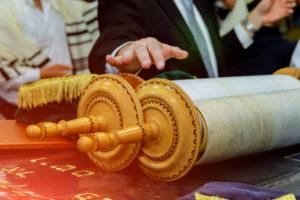
By Rabbi Abe Friedman
Parshat Tetzaveh
Mel Feynman, the father of Nobel Prize-winning American physicist Richard P. Feynman, worked as a uniform salesman. In his memoirs, Feynman describes how his father’s profession led to one of the defining lessons of his life:
“One of the things that my father taught me besides physics — whether it’s correct or not — was a disrespect for certain kinds of things … One time we were looking at a picture of the pope and everybody bowing in front of him. My father said, ‘Now, look at those humans. Here’s one human standing here, and all these others are bowing in front of him.
Now what’s the difference? … this difference is the hat he’s wearing.’ (If it was a general, it was the epaulets. It was always the costume, the uniform, the position.) ‘But,’ he said, ‘this man has the same problems as everybody else …’” (Richard P. Feynman, “What Do You Care What Other People Think?”, 18)
This week’s Torah portion, Tetzaveh, which describes in minute detail the various garments worn by the kohanim (priests) during their service, seems likely to provoke the same question: Why all the fancy clothes? Is there anything truly special about these kohanim, or is it just their special outfits?
Even as God designates the Levites and kohanim to serve in the Mishkan, the Israelites are just weeks out of Egypt; the same people who now take on a central leadership role were, not too long ago, toiling in the sun along with everyone else. By what right do they now separate themselves from the rest of the Israelites, living by a higher standard of purity and religious devotion?
Rabbi Naftali Tzvi Yehudah Berlin (Russia, 1817-1893) answers this question with a powerful insight into human behavior: The way we dress and the way we act are closely related to one another. If the kohanim — until recently, ordinary Israelites just like everyone else — were to start holding themselves to a different measure of religious piety, they could quickly come to believe that their status was somehow inherent in them, rather than granted by God’s decree. They would become arrogant, aloof, perhaps even abusive — qualities that go against the most basic values of spiritual leadership.
Donning the uniform, an external signifier of the role they were to play, served to remind the kohanim at all times that their role as leaders is actually a responsibility they take on — an act of service for the collective good — not personal aggrandizement.
Around this time last year, before BZBI reopened for those who want to attend in person, I mentioned in a d’var Torah that not only was I wearing a suit and tie each week, which everyone on the Zoom meeting could see, but I had also put on proper dress shoes — which remained off-camera, even when we stood for the Amidah. Why bother? What difference did it make if I wore oxfords, sneakers, flip flops or fluffy bedroom slippers?
The shoes themselves certainly made no difference to the congregation — but they had a strong influence on my spiritual and mental frame. My sense of presence and focus, my awareness of a rabbi’s responsibility to lead and guide, to comfort and support, were indelibly shaped by my choice to “dress the part.”
I am the same person wherever I go, but I understand my role differently wearing a suit to a wedding than when I wear swim trunks at the beach. I’m going to enjoy myself either way, but they are definitely not the same situation.
Parshat Tetzaveh offers all of us a reminder that we choose how we want to show up in each of life’s encounters — and we must choose deliberately and thoughtfully.
Rabbi Abe Friedman is the senior rabbi at Temple Beth Zion-Beth Israel in Philadelphia. The Board of Rabbis of Greater Philadelphia is proud to provide diverse perspectives on Torah commentary for the Jewish Exponent. The opinions expressed in this column are the author’s own and do not reflect the view of the Board of Rabbis.





